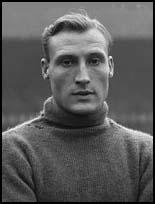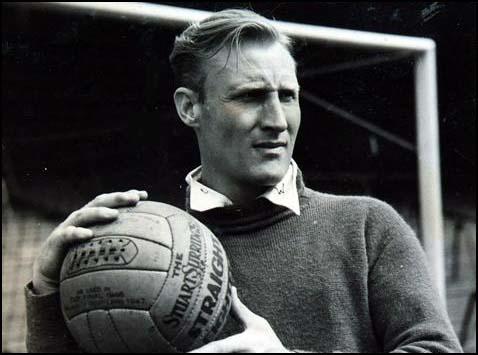Bert Williams

Bert Williams was born in Bradley on 31st January 1920. A talented goalkeeper, he joined Walsall in May 1937. Brian Glanville has commented: "Williams had joined the ground staff of Walsall, then a Third Division club, at the age of 15, and at 16 made his league debut. At 5ft 10in, it was originally thought he might not be tall enough for a professional goalkeeper, but he was fortunate that the manager of Walsall was the celebrated ex-England goalkeeper Harry Hibbs, who stood at 5ft 9in and displayed a sympathetic attitude towards his stature."
Williams made his debut for the club in a Third Division game against Bristol City on 16th October, 1937. He played in 25 games for the club before the outbreak of the Second World War. During the conflict he served in the Royal Air Force as a fitness instructor.
Ted Vizard, the managar of Wolverhampton Wanderers, signed Williams for a fee of £3,500 in September 1945. He joined a team that included Stan Cullis, Dennis Westcott, Johnny Hancocks, Sammy Smythe, Jesse Pye, Jimmy Dunn, Jimmy Mullen, Billy Crook, Roy Pritchard, Billy Wright, Bert Williams, Bill Shorthouse and Terry Springthorpe. As well as his outstanding goalkeeping abilities, his quick and accurate distribution often helped to set up attacks that led to goals.
Despite taking Wolves to third place in the 1946-47 season Ted Vizard was replaced by his assistant Stan Cullis in June 1948. The following year Cullis led Wolves to the FA Cup final against Leicester City. Wolves won the game 3-1 with Jesse Pye scoring two goals in the first-half and Sammy Smythe netting another in the 68th minute.
Williams won his first international cap for England against France on 22nd May, 1949, replacing the great Frank Swift in the team. England won 3-1 and Williams retained his place and that year played against the Republic of Ireland (0-2), Wales (4-1) and Italy (2-0). The England team that year included Tom Finney, Neil Franklin, Johnny Hancocks, Wilf Mannion, Jackie Milburn, Stan Mortensen, Jimmy Mullen, Jesse Pye, and Billy Wright.
The following season Wolves finished in 2nd place in the First Division. Wolves finished 3rd in 1952-53 and won the title in 1953-54 season with Johnny Hancocks as the club's top scorer. Williams later recalled that at the height of his earning power, he was paid £15 a week and travelled to home games on the bus.

A young teammate, Ron Flowers, pointed out that Williams was an outstanding athlete: "It was Bert Williams, a fitness fanatic if ever I saw one... who used to explain to me his body-building exercises. Bert, with his enthusiasm, soon had me as enthusiastic as he was, and during one of our pow-wows he casually mentioned that he thought I could become an even better player if I improved my speed. Now Bert was at that time the fastest man in League football. He had clocked just over ten seconds over 100 yards and I naturally took heed of him. The outcome was that Bert showed me how to stretch my leg muscles for running.... Typical of Bert Williams - and other senior professionals at Molineux - was his desire to help me not only as a footballer but as a man.
Gordon Banks, said of Williams: “I first saw Bert playing for Wolves in the cup final – and then when he was playing for England. I used to admire this guy so much. He was so athletic, so agile; he used to get to the ball in the top corner – such fabulous agility." Williams won the last of his 24 international caps for England against Wales on 22nd October 1955. England lost the game 2-1 and Williams was dropped from the team. The following year Williams retired from football. He had played 419 league and cup games for Wolves.
After ending his football career, he later ran a sports shop in Bilston. Later he concentrated on buying, refurbishing and selling on of manufacturing businesses. He retired to Shifnal in Shropshire. Steve Morgan, the chaiman of Wolverhampton Wanderers, has commented. “Bert was not only a fantastic footballer both for club and country, but also a true gentleman who loved Wolves. His footballing ability speaks for itself, but there was so much more to Bert than just his career alone. He remained heavily involved with Wolves and the community after his retirement, and the fundraising he has carried out since losing his wife was incredible when you consider his advancing years. Legend is a word which may be overused these days, but in the case of Bert Williams it simply doesn’t do him justice." After the death of his wife Evelyn in 2002, he devoted himself to fundraising for the Alzheimer's Society, and in 2010 was appointed MBE for services to football and charity.
Bert Williams died on 19th January 2014.
Primary Sources
(1) Ron Flowers, For Wolves and England (1962)
It was Bert Williams, a fitness fanatic if ever I saw one - he was a sergeant instructor in the R.A.F. - who used to explain to me his body-building exercises. Bert, with his enthusiasm, soon had me as enthusiastic as he was, and during one of our pow-wows he casually mentioned that he thought I could become an even better player if I improved my speed.
Now Bert was at that time the fastest man in League football. He had clocked just over ten seconds over 100 yards and I naturally took heed of him. The outcome was that Bert showed me how to stretch my leg muscles for running. Quietly, but for all that most successfully, it was the Wolves and England goalkeeper who helped me add considerably to my speed. What is more, because of the interest Bert took in me, I added a good deal to my speed off the mark, and, I think, all-round value to the team. Typical of Bert Williams - and other senior professionals at Molineux - was his desire to help me not only as a footballer but as a man.
(2) Brian Glanville, The Guardian (20th January, 2014)
One of the finest English goalkeepers since the second world war, Bert Williams, who has died aged 93, won the league championship and FA Cup with Wolverhampton Wanderers. For the national side, he played in their first World Cup finals, in Brazil in 1950.
He had first been chosen to play for England in an unofficial Victory International against France at Wembley in 1945, which the French surprisingly drew 2-2. He returned to the England team against France the following year in Paris: England lost 2-1, one of the French goals coming when Williams was forced over his goal line with the ball.
His official international debut came in Paris in 1949, when England won 3-1 despite an untypical mistake from Williams that gave away an early goal. It was plain by then that Frank Swift, who had for years been England's first choice keeper, was approaching the end of his career. With a superb display at home against Italy in the same year, Williams secured the succession.
The first of three dramatic saves, all in the first half, came from Rinaldo Martino, the Argentine, playing inside-left for Italy that day. Put clean through by Amedeo Amadei with an inspired pass, he had only Williams to beat. His shot was hard and true, but Williams catapulted himself across his goal to reach it. Next he blocked Riccardo Carapellese's point-blank drive, and finally he twisted in mid-air to save a shot by Benito Lorenzi that suddenly changed course when it hit the England left back, John Aston.
Now assured a spot in the international team, Williams was England's goalkeeper the following year in the World Cup finals, and it was hardly his fault that they should fail so embarrassingly. He kept a clean sheet when Chile were beaten 2-0 in Rio in the opening game. Then came catastrophe; a 1-0 defeat by a scratch team from the US, followed by defeat against Spain by the same score. In all, Williams won 24 full England caps between 1949 and 1955, his last against Wales.
